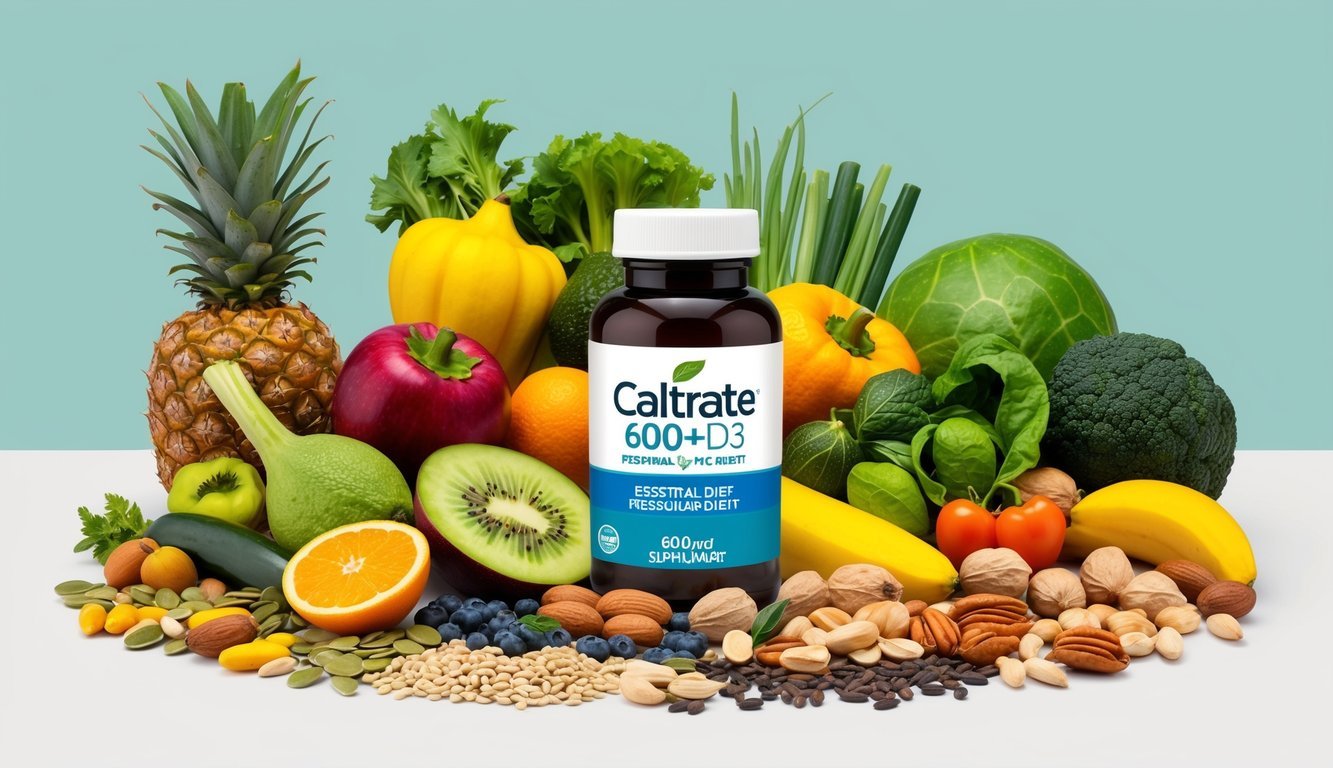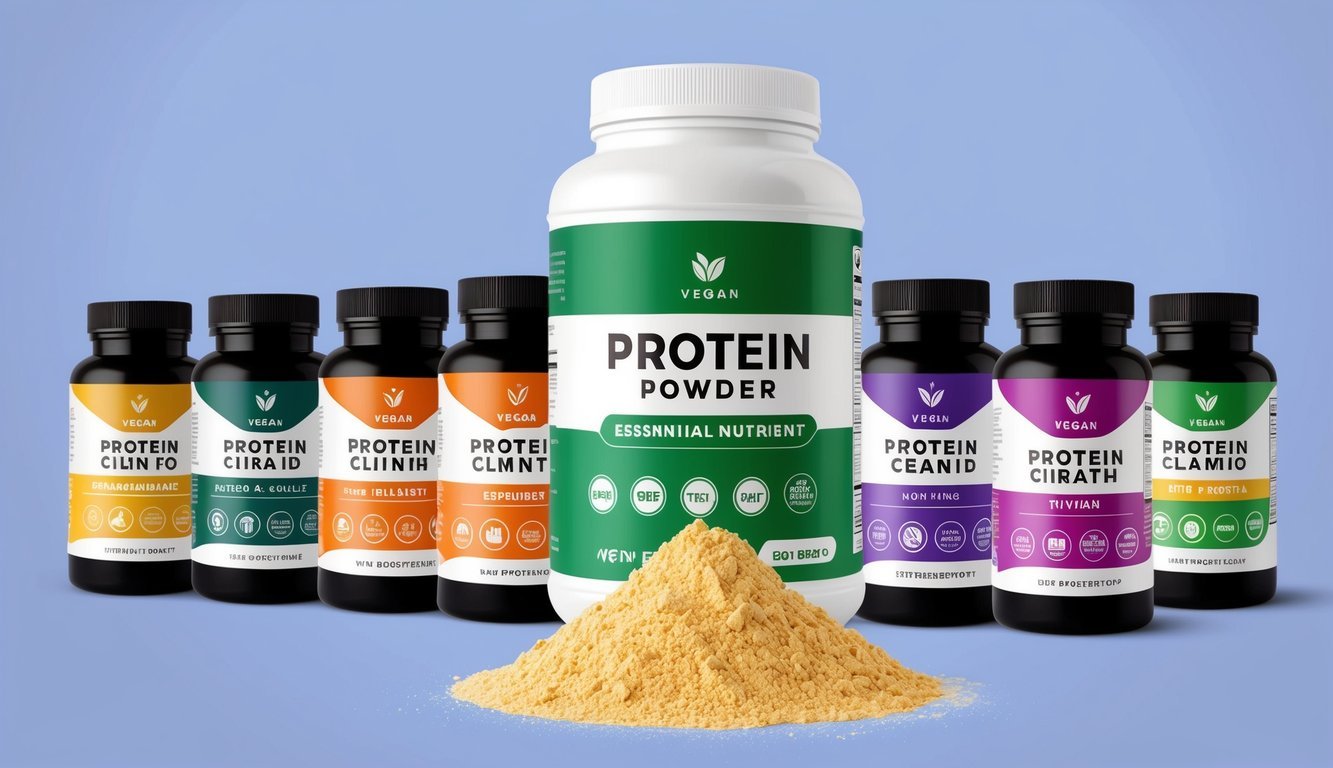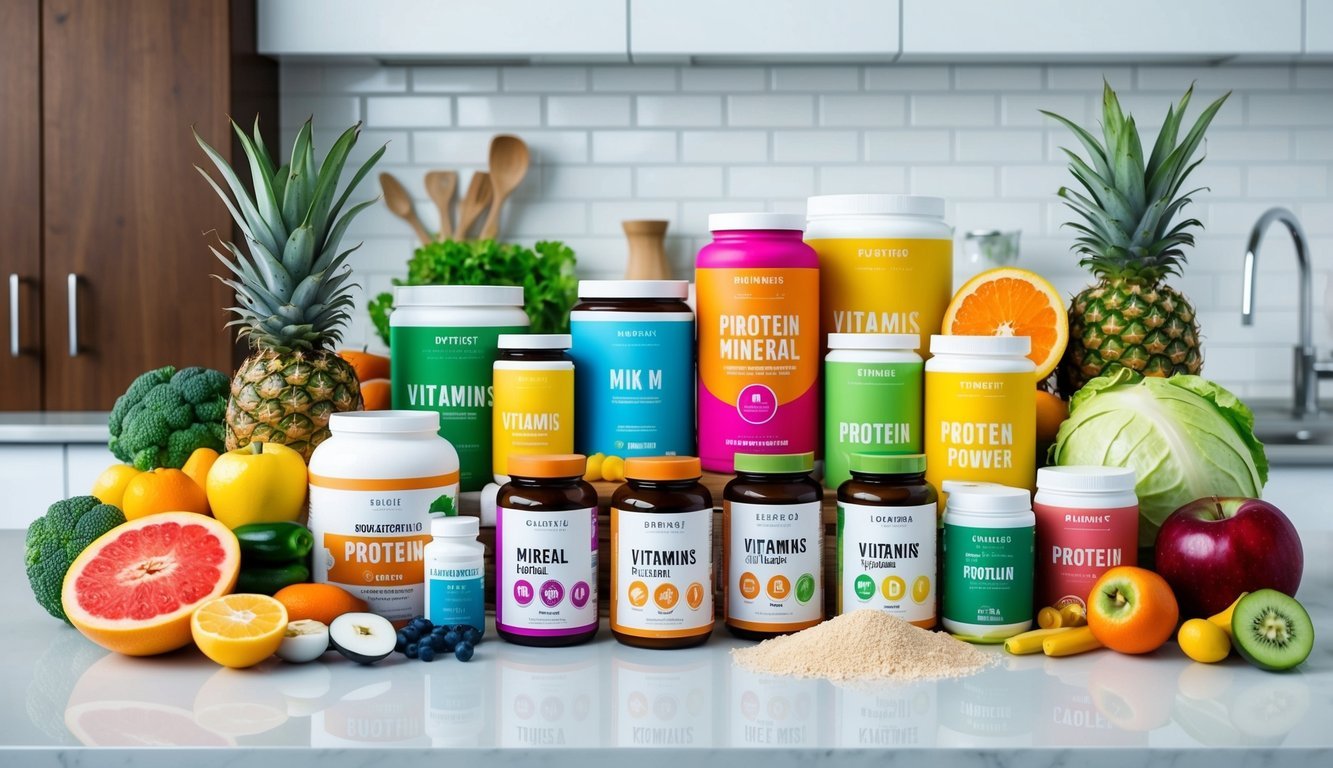As someone who embraces a vegan lifestyle, I know how important it is to ensure I get all the necessary nutrients.
While a well-planned vegan diet can provide many essential vitamins and minerals, some nutrients could be harder to obtain from plant-based sources alone. That’s why incorporating certain supplements can be a game-changer for maintaining my health and well-being.

Navigating nutrition on a vegan diet can be a bit tricky, especially with all the conflicting information out there.
I’ve learned that taking the right supplements can help bridge the gap and ensure I’m not missing out on key nutrients.
Whether I’m new to veganism or have been at it for years, understanding which supplements to consider is crucial for staying healthy and energized.
1) Vitamin B12
Vitamin B12 is a crucial nutrient for anyone, especially for those following a vegan diet.
Since B12 is primarily found in animal products, I need to be mindful about how I get enough of it.
I’ve learned that my body requires B12 for red blood cell production and maintaining a healthy nervous system.
Without adequate B12, I could face serious health issues, such as anemia and nerve damage.
Fortified foods are a reliable way for me to fill the gap.
I often choose fortified plant-based milks, cereals, and nutritional yeast.
Eating these regularly helps ensure I get enough B12.
If I’m not getting enough from foods, I consider supplements.
It’s recommended to take a daily supplement providing at least 10 micrograms or a weekly one with 2000 micrograms.
I find this helps keep my levels in check.
Staying informed about my B12 intake makes me feel more confident about my diet choices.
By incorporating fortified foods or supplements, I can support my health effectively.
2) Iron (Ferrous Sulfate)
Iron is crucial for anyone on a vegan diet, especially since plant-based sources contain non-heme iron, which is less readily absorbed.
I often turn to ferrous sulfate, a well-researched form of iron supplement.
Ferrous sulfate is effective in boosting iron levels and is commonly recommended for those who need extra support.
I appreciate that it’s widely available and relatively affordable.
One thing to remember is that iron absorption can be tricky.
Taking iron supplements with vitamin C can enhance absorption, so I often pair them with a glass of orange juice.
It’s also important to space out iron supplements from calcium and other minerals, as they can inhibit absorption.
I make sure to keep an eye on how I take my supplements throughout the day.
If you’re considering ferrous sulfate, it’s always a good idea to consult with a healthcare professional to determine the right dosage for your needs.
With the right approach, you can effectively support your iron intake on a vegan diet.
3) Calcium (Caltrate 600+D3)

When it comes to calcium, I often turn to Caltrate 600+D3.
It’s a reliable option that supports bone health, especially for those of us on a vegan diet.
Caltrate 600+D3 includes calcium and vitamin D3, both crucial for strong bones.
Vitamin D3 helps my body absorb calcium more efficiently, making it a great combo.
This supplement is simple to incorporate into my routine.
I take it daily, and it helps ensure I meet my calcium needs without dairy products.
Many vegan sources of calcium, like leafy greens and fortified plant milks, can be inconsistent.
That’s where a supplement like Caltrate comes in handy to fill the gaps.
With sufficient calcium intake, I feel more confident about supporting my bone health as I navigate my vegan lifestyle.
4) Omega-3 (Flaxseed Oil)
I’ve always heard about the importance of omega-3s in our diet.
For those on a vegan journey, getting enough of these essential fatty acids can be tricky.
That’s where flaxseed oil comes into play.
Flaxseed oil is a fantastic plant-based source of alpha-linolenic acid (ALA), one of the three main types of omega-3s.
I find it easy to add to smoothies or drizzle over salads.
Just a tablespoon can pack a punch of nutrients.
Beyond just omega-3s, flaxseed oil also offers some fiber when you use whole flaxseeds.
This is great for digestion too.
Plus, incorporating flaxseed oil can support heart health and help with inflammation.
When I look for a good source, I often check for cold-pressed options.
This retains more nutrients and flavor.
So next time I’m shopping, I make sure to grab a bottle of flaxseed oil to boost my omega-3 intake!
5) Vitamin D2 (Ergocalciferol)

I often think about how important Vitamin D is, especially for vegans. Vitamin D2, also known as ergocalciferol, is the plant-based form of this essential nutrient.
It’s typically derived from yeast that has been exposed to ultraviolet light.
Many plant milks are fortified with Vitamin D2, making it easier to include in my diet.
While D2 is a solid option, it’s worth noting that it may not be as effective as Vitamin D3 in boosting blood levels.
For those looking for a vegan source of Vitamin D3, there are supplements made from lichen.
Still, if I’m sticking to D2, I find it beneficial to ensure I regularly consume fortified foods or supplements.
Getting enough Vitamin D2 is key for maintaining bone health, immune function, and overall well-being.
Balancing my nutrient intake is crucial, and keeping my Vitamin D levels in check helps me feel my best.
6) Zinc (Garden of Life Zinc)

When I think about essential supplements for a vegan diet, zinc always comes to mind.
It’s a crucial mineral that supports various bodily functions, particularly the immune system.
I like Garden of Life Zinc for its high potency.
Each serving provides 30 mg of elemental zinc, which is about 273% of the daily value.
This ensures I’m getting enough to support my health.
What I appreciate is that it also contains vitamin C.
This combination not only boosts immune health but also helps with the absorption of zinc.
Plus, it’s made from whole food sources, which feels better for my body.
Zinc is also known to aid metabolism, helping me get energy from the nutrients in my food.
With this supplement, I feel more confident that I’m covering my nutritional bases while following a vegan lifestyle.
7) Protein Powder (Garden of Life Raw Protein)

When it comes to protein powders, I often turn to Garden of Life Raw Protein.
It’s plant-based, USDA organic, and really fits into my vegan lifestyle.
Each serving delivers 22 grams of protein, which helps me meet my daily needs.
I like that it includes a complete profile of essential amino acids, making it a solid choice for recovery after workouts.
The texture is silky smooth, and it mixes well in smoothies or just water.
It’s also free from dairy and gluten, so I don’t have to worry about any allergens.
What I appreciate is that it includes probiotics, which support my digestive health.
Plus, it has added fat-soluble vitamins that are essential on a vegan diet.
Whether I’m busy with work or at the gym, Garden of Life Raw Protein keeps me fueled and satisfied.
Why Supplements Are Important for Vegans

As a vegan, it’s crucial to understand that certain nutrients might not be adequately obtained from plant-based foods alone.
Supplements can help fill these gaps and support overall health in various ways.
Nutritional Gaps in a Vegan Diet
Plant-based diets can be rich in many nutrients but may fall short in others, notably Vitamin B12, Vitamin D, iron, and calcium.
- Vitamin B12 is primarily found in animal products and is vital for nerve health and red blood cell formation. Without it, I risk anemia and nerve damage.
- Vitamin D, especially D3, supports bone health and immune function. The vegan sources like D2 are effective but can be less potent.
- Iron from plant sources is non-heme and less absorbable than heme iron from animal products. Consuming it with vitamin C can enhance absorption.
- Lastly, while some believe plant diets reduce calcium needs, those on a vegan diet should monitor their calcium intake to maintain bone strength.
Health Benefits of Meeting Nutrient Needs
Taking supplements helps me meet my specific nutrient needs and can lead to various health benefits.
Adequate nutrient intake strengthens my immune system, supports energy levels, and improves overall well-being.
For instance, ensuring I get enough Vitamin B12 can prevent fatigue and maintain focus.
Likewise, a Vitamin D supplement during less sunny months can uplift my mood and enhance bone density.
In addition to vitamins, regular exercise plays a crucial role in overall well-being.
The strength training benefits for mental health include reduced stress, improved cognitive function, and enhanced self-esteem.
Combining proper nutrition with physical activity creates a balanced approach to maintaining both mental and physical health.
Moreover, meeting my nutrient needs can protect against deficiencies that may lead to longer-term health issues.
With supplements, I can enjoy the benefits of a balanced diet without compromising health, even while following a vegan lifestyle.
How to Choose the Right Supplements

Selecting the right supplements is crucial in maintaining a balanced vegan diet.
I focus on understanding labels and seeking professional advice to ensure I’m meeting my nutritional needs.
Understanding Supplement Labels
Reading supplement labels can feel overwhelming at first.
Key factors to look for include:
- Ingredients: Make sure to check for vegan certification to avoid animal-derived ingredients.
- Nutrient Amounts: Ensure the dosage aligns with your dietary requirements. For example, look for B12 and Vitamin D content that meets daily needs.
- Form: Consider whether you prefer capsules, powders, or gummies. For instance, if you dislike the taste or texture, capsules might be the way to go.
- Additives: Avoid unnecessary fillers or synthetic preservatives that don’t benefit your health.
Being mindful of these aspects helps you select supplements that genuinely support your vegan lifestyle without any unwanted additives.
Consulting with Healthcare Providers
I believe consulting with healthcare providers is essential when choosing supplements.
They can offer personalized advice based on my health history and dietary habits.
- Blood Tests: My doctor might suggest testing nutrient levels, like B12 or iron, to identify specific needs.
- Dietary Restrictions: They understand my dietary restrictions and can recommend suitable supplements that won’t interfere with any conditions I have.
- Recommendations: Healthcare providers often have insights into which brands or types of supplements are effective and reliable.
By leveraging their expertise, I can make informed choices.
Their guidance helps me avoid unnecessary trial and error in the pursuit of optimal health.

